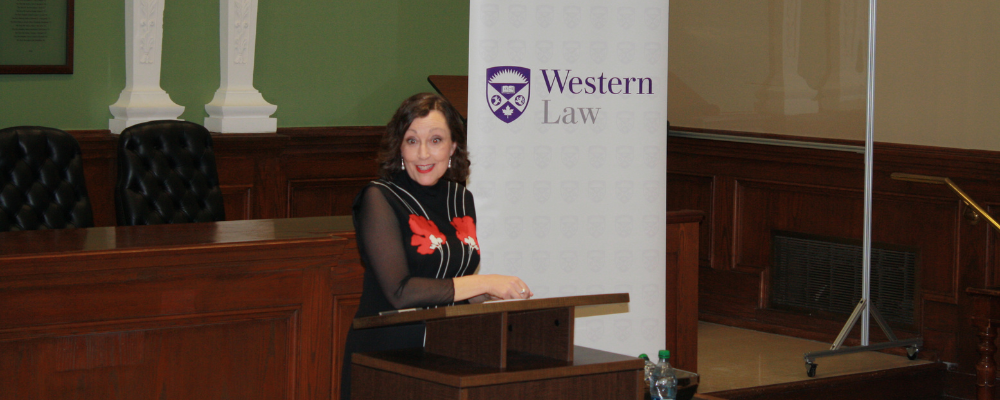Aileen Kavanagh examines “Underuse of the Override” at 2023 Coxford Lecture
April 18, 2023

Professor Aileen Kavanagh – Chair of Constitutional Governance at Trinity College Dublin and Director of TriCON, the Trinity Centre for Constitutional Governance – joined Western Law to present the 2023 Coxford Lecture on March 27.
Kavanagh explored the ability of legislatures to override court decisions on rights as a defining feature of the New Commonwealth Model of Constitutionalism in the United Kingdom and Canada. She explained that while section 33 of the Charter in Canada and section 19 of the UK Human Rights Act grant legislatures similar override powers under “strictly confined conditions,” the provisions have been rarely used.
“With the increased use of the notwithstanding clause in both Ontario and Quebec this was a very timely discussion of a pressing social and legal issue,” said Professor Andrew Bottrell, co-Director of the lecture noting a recent trend outside of the norm. “Professor Wright and I were thrilled to welcome an academic of Professor Kavanagh’s stature to campus.”
According to Kavanagh, the override has only been used 22 times in 40 years in Canada. Since the Human Rights Act was enacted, the UK government has only made two negative statements of incompatibility (that a statute is incompatible with the European Convention on Human Rights).
In her lecture, Kavanagh provided an overview of Canadian scholarship on why the override has been so rarely used. She began with the argument of path dependence wherein a controversial override in Quebec in the early years of the Charter made it so that the override became “not a legitimate modus operandi for responsible politicians in the Canadian constitutional culture.” Additionally, she explained that textual constraints outlined in section 33, as well as the political reputation and the portrayal of the override in Canadian constitutional writing as a “nuclear bomb,” play into its sparce use.
“The political costs were fully known by the political actors who crafted these innovations and these compromises, and they were hardwired into the document, with foresight, not with oversight,” said Kavanagh. “This was underuse by design, not demonization. The political costs that would deter and disincentivize frequent or liberal use of the override were built into the process from the get-go.”
While Kavanagh’s lecture was entitled “Underuse of the Override”, she did not argue that legislatures in Canada and the UK should override rights with more regularity. She believes that, while rulings contrary to rights may be necessary in extenuating circumstances, their sparing use is critical to protecting the rule of law and true to the original intent of the mechanism.
“The power of override, I argue, was and must be coupled with a duty to act with care and comity,” said Kavanagh. “That was what was intended by the original drafters of these mechanisms, that is what has happened in practice. Through my eyes, that is an achievement of constitutional democracy, not one we should lament and decry.”
The Coxford Lecture is generously funded by Western Law graduate Stephen R. Coxford, LLB ’77. Each year, the lecture series brings leading legal thinkers to Western Law to address pressing issues related to the rule of law.






